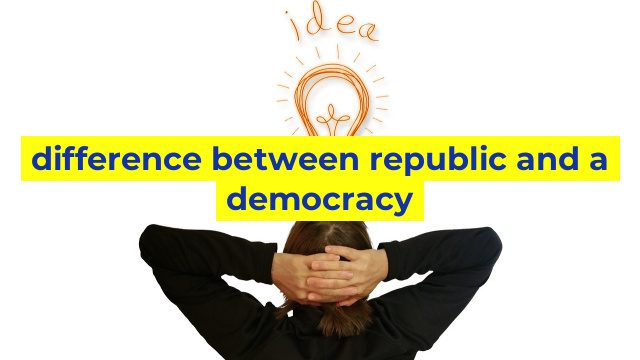The Fundamental Differences Between a Republic and a Democracy
When it comes to political systems, there seems to be a lot of confusion surrounding the difference between a republic and a democracy. Many people use the two terms interchangeably, assuming that they are one and the same. However, while there are similarities between the two, the differences are significant and worth exploring.
Democracy
Democracy is a form of government in which power is held directly or indirectly by the people. This means that citizens participate in the decision-making process, either through direct voting or by electing representatives to represent their interests. In a pure form of democracy, every individual would have an equal say in the decisions that are made, regardless of their status or position in society.
However, in practice, democracy is often limited to some extent by factors such as the need for a stable government, and the requirement to balance the rights of individual citizens with the greater good of society as a whole. Nevertheless, democracies typically have certain features in common, such as regular elections, freedom of speech, and the ability of citizens to form and join political parties.
Republic
A republic, on the other hand, is a form of government in which power is held by elected representatives, rather than directly by the people. This means that voters elect representatives to serve as their voice in government, and those representatives then make decisions on behalf of the citizens they represent. Typically, republics have constitutions or other governing documents that establish the rules and principles that govern the conduct of government officials and citizens alike.
One of the key benefits of a republic is the ability to separate powers between different branches of government. For example, in the United States, the legislative, executive, and judicial branches are all separate and independent, which helps to prevent any one branch from becoming too powerful. Additionally, because elected officials are chosen to serve for a limited period of time, they are less likely to be swayed by short-term political considerations, and more likely to focus on the long-term needs of the country.
The Difference between a Republic and a Democracy
The primary difference between a republic and a democracy is the way in which power is exercised. In a democracy, the people have the right to make decisions directly, while in a republic, the people elect representatives to make decisions on their behalf. Additionally, while democracies tend to focus on the will of the majority, republics are often designed to protect the rights of minorities, as well as the interests of the whole.
Ultimately, both republics and democracies are designed to provide citizens with a voice in their government, but their approaches to doing so are quite different. Whether one form of government is better than the other is a matter of debate, but understanding the fundamental differences between the two is essential for anyone who seeks to engage in political discussions or debates.
Table difference between republic and a democracy
| Republic | Democracy | |
|---|---|---|
| Definition | A form of government where the citizens have the power to elect representatives who govern the state on their behalf. | A form of government where the citizens have the power to directly participate in the decision-making process through free and fair elections, referenda, or other forms of participation. |
| Leadership | Leaders are elected representatives who make decisions on behalf of the citizens. | Leaders are elected or appointed by the citizens to make decisions in their interest. |
| Rule of Law | There is a supreme law that must be followed by all, including the government and the citizens alike. | The rule of law is followed, but the citizens have more power to influence and shape the laws themselves. |
| Citizenship | Citizenship is based on birth or naturalization, and citizens have the right to vote and participate in the political process. | Citizenship is based on birth or naturalization and citizens have the right to vote and participate in the decision-making process directly. |
| Political Stability | Republics tend to be more politically stable due to the election of representatives who make decisions on behalf of the citizens and the checks and balances in place. | Democracies may experience political instability due to the direct participation of citizens in the decision-making process. |

